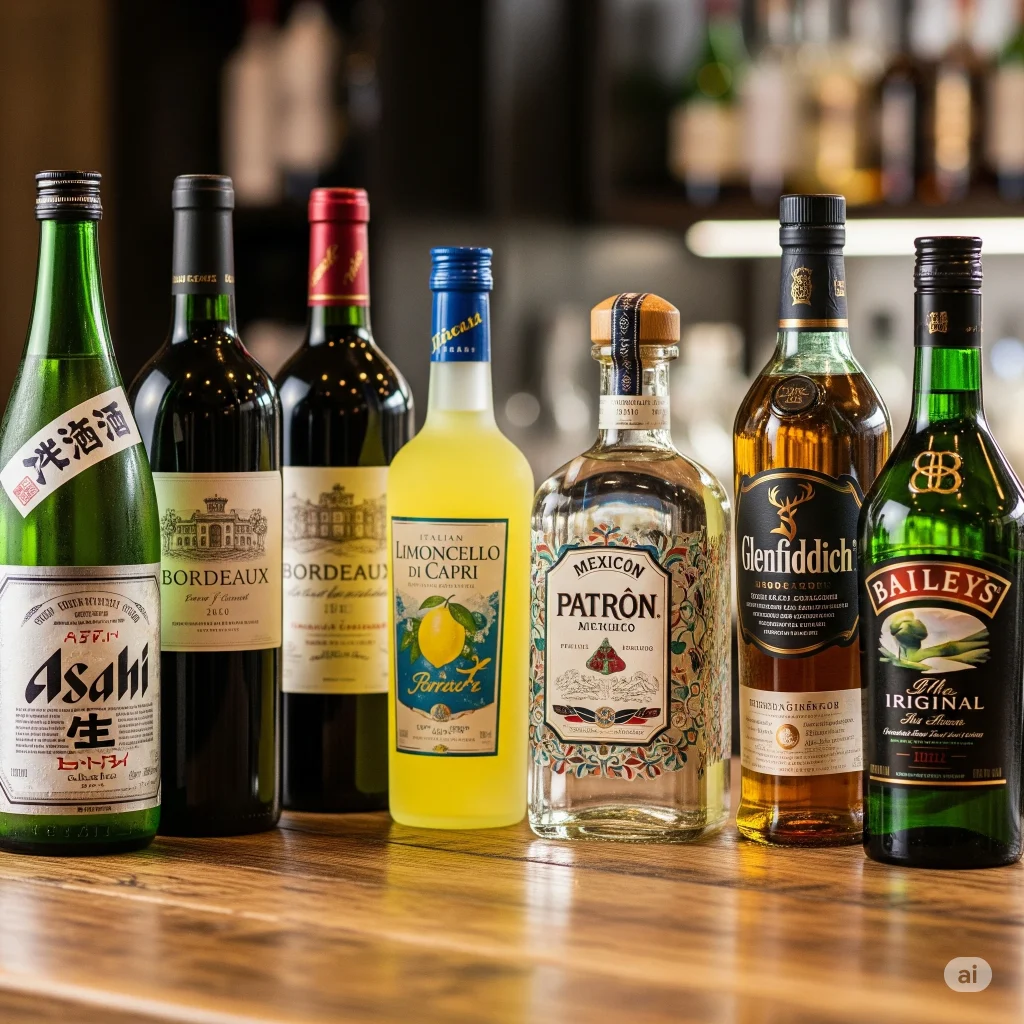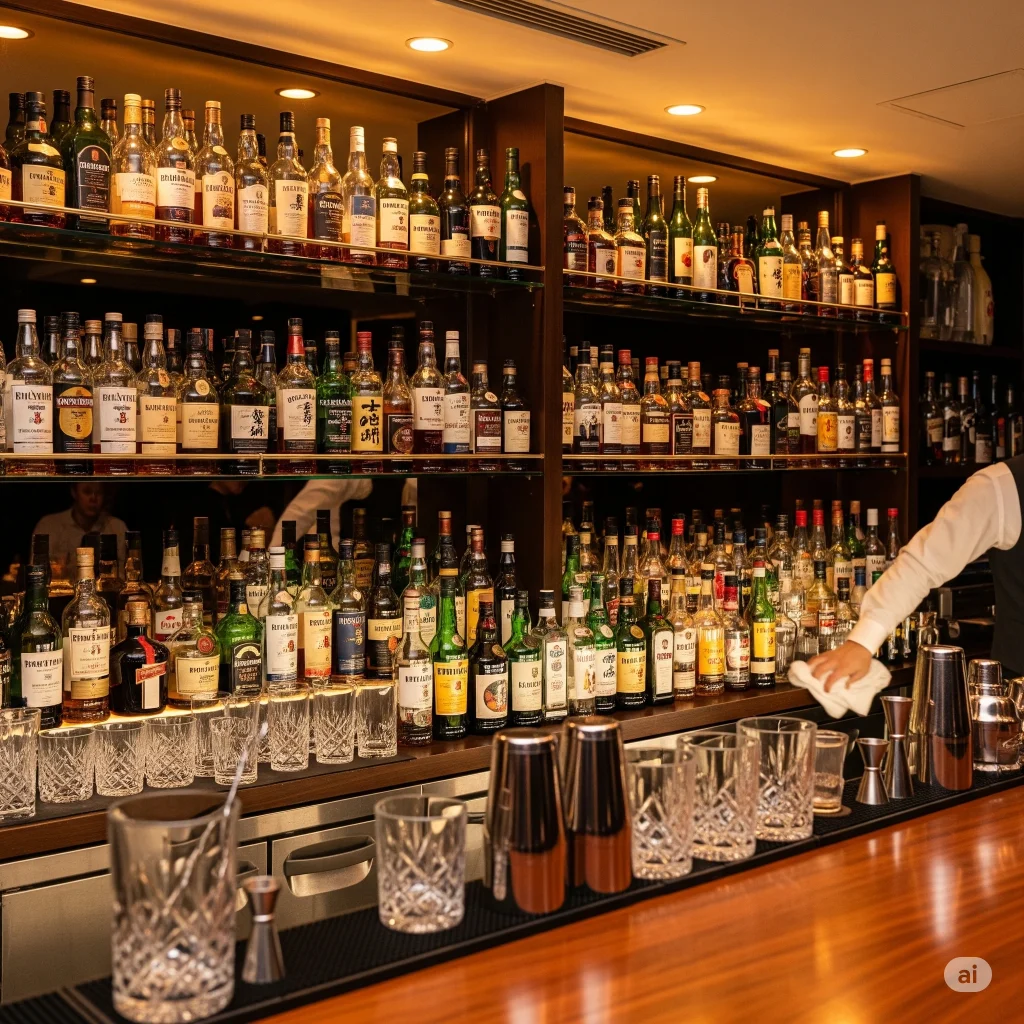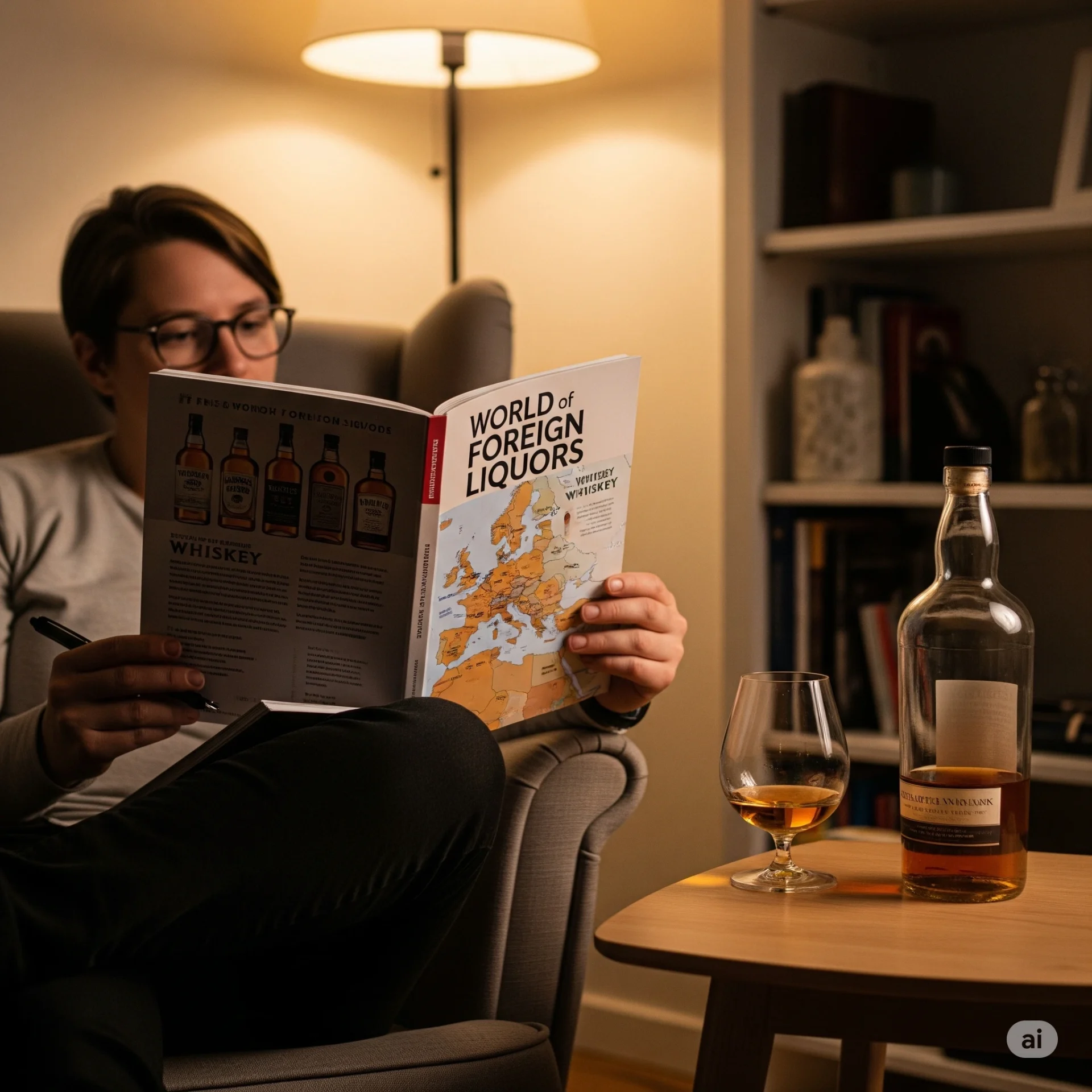Many people hear the term “foreign liquor” at parties, hotels, airport duty-free shops and restaurants. Not everyone is aware of what foreign liquor means, do you? Let’s find out.
Foreign liquor is a term that refers to alcohol drinks made outside of your country, and then imported for sale. People think these drinks are special because they’re made in places known for making them well. Scotch whisky comes from Scotland and tastes smoky. Real Champagne is bubbly and only comes from a certain area in France. Tequila is made in Mexico from agave plants. Sake is a rice wine from Japan that’s been around for a long time. Each drink gets its main flavor and reputation from the country it comes from.
It’s not just about drinking alcohol, it’s also about learning about the culture, traditions, and history of another country. Every bottle has its own story. You can taste where the ingredients grew and how people made it using old methods. The folks who made it feel proud. When these bottles go to other countries, they bring a bit of their home with them. This is why people prefer foreign brands because they feel that the products are more premium and unique.
This article will examine foreign liquor in depth, including its meaning, types, production process, reasons for it’s popularity, legal issues, storage tips, as well as some fascinating facts.
What Is Foreign Liquor

Foreign liquor means any kind of alcohol that comes from another country. People make it outside your own country and then bring it in. If it’s made here, it’s not foreign liquor. Simple as that.
Whisky and beer are good examples of drinks that are made in different places, and every spot has its own way of doing things. That’s why a beer from Germany isn’t the same as one from Japan. Local traditions make each drink special, kind of like how your grandma’s cookies taste different from your friend’s grandma’s, even if it’s the “same” recipe.
Now, even if you make a famous foreign drink in your own country—let’s say you’ve got permission and you use their exact recipe—people still call it “foreign liquor.” Why is that? It’s because the brand, the rules about how you make it, and even the recipe all come from another country. Johnnie Walker is a good example. It started in Scotland. Sometimes they bottle it in other countries, but they follow the strict Scottish way of doing things. Because it began in Scotland and follows their methods, everyone keeps calling it “foreign alcohol.” That label sticks because, honestly, you can’t just change where something comes from by moving it around.
Want To Know About Which Business Idea Would Be Better For You?
Go Through Our Startup Selector Tool
Foreign Liquor Types – A Detailed Overview
Foreign liquor is a vast category of drinks that include many different varieties. Each type of foreign liquor has its own ingredients, taste profile, and production method.
Whisky
- Origin: Scotland, Ireland, USA, Canada, Japan
- Ingredients : Made of grains such as corn, wheat, barley or rye
- Special: This product is aged in wood barrels over many years to give it rich flavors. It also has a smooth texture. The wood adds a natural color to this drink
- Varieties:
- Scotch, a malt that is often earthy and smoky due to its use of peat
- Irish Whiskey Lighter and smoother. Often triple-distilled
- Bourbon, a sweeter version of the American spirit, with notes caramel and vanilla
- Canadian whisky is mild and easy to drink
- Famous Brands: Johnnie Walker, Chivas Regal, Jameson, Jack Daniel’s
Vodka
- Origin: Russia, Poland, Sweden
- Ingredients: Made with potatoes or grains such as wheat and rye
- Special Features: It is clear, odorless and neutral-flavored, which makes it ideal for mixing into cocktails
- Famous Brands: Absolut, Smirnoff, Belvedere, Grey Goose
Rum
- Origin : Caribbean countries such as Jamaica, Cuba and Puerto Rico
- Ingredients : Made of sugarcane juice and molasses
- Feature Can be mild (light), rich (deep and dark), or spiced up with herbs and flavors. For extra flavor, they are often aged in barrels
- Famous Brands: Bacardi, Captain Morgan, Mount Gay
Read More: Fruit Wine – Understanding The Whole Process
Gin
- Origin: England, Netherlands
- Ingredients Grain alcohol with botanicals such as coriander, citrus, and spices
- Special Feature Crisp, herbal and aromatic, usually served with tonic
- Famous Brands: Bombay Sapphire, Tanqueray, Gordon’s
Tequila and Mezcal
- Origin: Mexico
- Ingredients Made from blue agave plants (for tequila), or other types of agave (for mezcal)
- Special Features Tequila has a smooth, sweet taste while mezcal is smoky due to its roasting
- Famous Brands Don Julio Patron Jose Cuervo
Wine
- Origin : France, Italy Spain, Australia South Africa USA
- Ingredients : Made of fermented grapes
- Special Feature : Available in red, rose, white and sparkling varieties. The taste depends on the grape variety, climate and aging.
- Famous Brands : Moet & Chandon, Gallo, Jacob’s Creek
Beer
- Origin : worldwide, with strong tradition in Germany, Belgium and the USA
- Ingredients : Made with barley, hops and water
- Special Feature Crisp and refreshing, available in dark or light styles
- Famous Brands: Heineken, Budweiser, Corona
Liqueurs
- Origin: Various countries
- Ingredients Alcohol mixed with cream, sugar, herbs, spices or fruits
- Special Feature : Sweet and used often in desserts or cocktail
- Famous Brands: Baileys Irish Cream, Kahlua, Cointreau
Read More: How to Start a Profitable Wine Production Business in India
How To Make Foreign Liquor – Step by step
Although the process is different for each drink, most of them follow the same steps:
- Selecting Ingredients
- The flavor is determined by the base ingredient (grains, fruits, potatoes, sugarcane or sugarcane).
- Drinks that are produced in countries with the perfect climate for certain crops taste extraordinary.
- Fermentation
- Add yeast to ingredients to convert natural sugars to alcohol.
- The process can take anywhere from a few days to two.
- Distillation
- The liquid is heated to the point that alcohol vapor rises, and is collected. This makes the drink purer and stronger.
- Aging
- Whisky, rum and brandy can be aged for many years in barrels made of wood. The flavors are enhanced.
- Blending and bottling
- You can blend different batches to get the same taste each time.
- The bottles are then labeled and sealed for sale.
Why people prefer foreign liquor
- Quality & Reputation : Many foreign liquors use strict quality standards and centuries-old traditions to make them.
- Offers unique flavors: Tastes not found easily in local brands.
- Status symbol: Seen to be a sign for style and wealth.
- Cultural Experience : An opportunity to learn about another culture.
- Gift Selection: Popular premium gift for special occasions.
Read Our Book: Click Here
Table of Popular Foreign Liquors
| Types of | Main Ingredient | Country of Origin | Taste Profile | Ageing Required? | Example |
|---|---|---|---|---|---|
| Whisky | Barley and rye | Scotland, USA | Smoky, sweet, rich | Yes, | Johnnie Walker, Jameson |
| Vodka | Potatoes, grain | Russia and Poland | Neutral, smooth | No, | Absolut Smirnoff |
| Rum | Sugarcane | Jamaica and Cuba | Sweet and spicy | You can also find out more about | Bacardi, Captain Morgan |
| Gin | Grain + herbs | England | Herbal and citrusy | No, | Bombay Sapphire |
| Tequila | Agave | Mexico | Sweet earthy | You can also find out more about | Don Julio, Patron |
| Wine | Grapes | France, Italy | Fruity, dry, sweet | You can also find out more about | Moet Jacob’s Creek |
| Beer | Barley and hops | Germany and USA | Crisp, malty | No, | Heineken, Budweiser |
Taxes and Rules
When purchasing foreign liquor, you may notice that it is more expensive than local brands. Import duties and taxes are a big reason for this. Governments impose these added fees to earn revenue and for safeguarding local businesses. These taxes can include customs duties, excise duties, and special liquor taxes. Sometimes, these fees can inflate the price to two to three times the amount of the foreign price.
There are also strict legal requirements regarding the purchase and sale of foreign liquor. Only registered shops, hotels, and bars can sell foreign liquor. This helps to monitor the sale of foreign liquor to prevent the circulation of illegal liquor.
There are also rules for travelers which they must abide by while at the airport. India and most other countries allow travelers to purchase foreign liquor and limit the quantity to 1 to 2 liters without customs charges. If you exceed this limit, you will be subject to taxes at the airport. This rule helps prevent bulk smuggling and regulate the circulation of foreign liquor.
These policies might look unbending; however, they play a significant role in the enforcement of law, safety measures, and even the economy of the country..
Read More: The Business of Fatty Alcohols: Opportunities for Growth
Proper Foreign Liquor Storage Guidelines
Foreign liquor often retains and preserves its value with its aging process, thus its storage in liquor cabinets needs caution to maintain its quality, smell, and taste.
Store bottles in a dark, cool place – Liquor can go bad if it is placed in excessively hot regions to the sunlight for a long time. Placing the liquor in a cabinet, closed shelf, or a wine rack is ideal. This storage will also prevent light from spoiling the liquor’s flavor.
Keep corks upright to avoid damage – Keep your bottles standing up. This helps protect the cork. If the cork gets too dry, it can crack and let air in, which ruins your drink. If the cork gets too wet, it might fall apart and mess up your liquor. So, just keep bottles upright. This keeps the cork in good shape and your liquor safe.
Keep bottles closed tightly after opening – Bottles must be closed tightly and kept closed after usage. Preferring tight lids increases the preservation of the liquor’s taste and aroma. To maintain the wine quality, special stoppers and vacuum pumps can be employed.
If kept properly, foreign liquor can last for several years without losing its charm. With time, such liquor increases in flavor and aroma, making every sip worth the money spent.
Read Our Project Report: Click Here
Interesting Facts
Foreign liquor has some alluring facts and stories that make them more interesting. Here are some interesting facts that we can look at.
Champagne is a protected product – Only the region of Champagne in France is allowed to produce true Champagne. No other country can replicate the product and give it the same name. Because of this, the region is very reputable.
Scotch Whisky must be aged for at least 3 years – The law in Scotland states that a whisky is only eligible to be termed as Scotch once it has aged for at least 3 years in a barrel made of oak wood. This is what gives it the deep flavor and the smooth drinkability.
Japanese whisky beats Scottish brands in awards – Recently Japanese brands have been doing extremely well in the whisky awards on an international scale, and at times, surpassing the Scottish brands. This is an indication of the skill that Japanese distillers have been able to achieve.
Some wines get better with age – Not all wines are meant to be drunk immediately. With the right amount of aging, certain wines can greatly increase in flavor and complexity, thus becoming bonny.
These examples prove that foreign liquor is more than just a drink—it is a product of society, civilization, and skills.
Health Aspects

Partaking of foreign liquor may be delightful and enjoyable, yet liquor’s effect on the body and mind is something to note.
Drink responsibly – Excessive intake of liquor can impose serious risks to the liver, heart and even to one’s brain; drinking in moderation is the only healthy and safe way to enjoy the liquor’s taste without damaging your health.
Adhere to the minimum drinking age – Each country has a minimum age for drinking (in most of India, for example, the minimum age is set between 18 to 25 years.) Adhering to such laws is bound to protect you and your mind.
Do not mix drinking and driving – Alcohol intake will slow one’s reaction time, impair judgment and increase the chances of accidents occurring. Always resort to taxi late, ride-sharing services, or a sober friend willing to drive after drinks.
Conclusion
It’s not just a drink, it’s an experience. Each drink has its own unique taste, whether it is the smoky, deep flavor of Scotch or the clear, crystal-clear taste and aroma of vodka.
It may seem like a luxurious experience to own or enjoy foreign liquor, but its real value comes from knowing and understanding its history. Drink responsibly and enjoy the flavors with moderation.
Foreign Liquor – FAQs
Q1 : How is foreign liquor different than local liquor?
A : Foreign alcohol is imported from abroad, while local liquor is produced in your country.
Q2 : Why does foreign liquor cost more?
A : Taxes and brand reputation are added to the price.
Q3 : Can you bring it in from abroad?
A : Yes but within the customs limits of your country.
Q4 : Does the taste taste better?
A : Most people believe so, but tastes are personal.
Q5 : Does foreign liquor expire?
A : Opened bottles can lose their flavor after a while.
Q6 : Does all wine come from foreign liquors?
No, only if imported. Locally made wine does not qualify.
Q7 : What duty-free liquor is?
A : Duty-free liquor is imported liquor that’s sold at special shops in airports.







